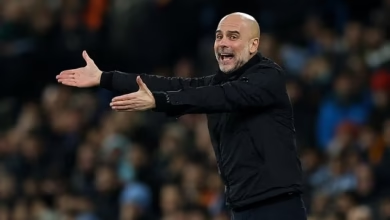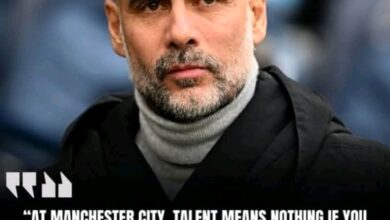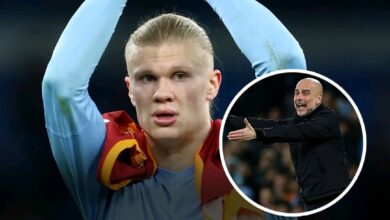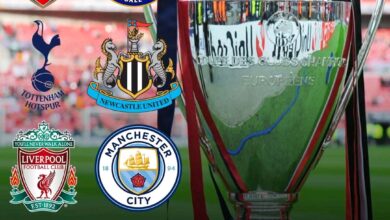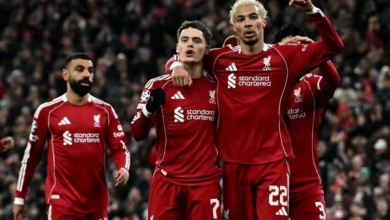Four deals Arsenal can complete this week as Andrea Berta eyes Benjamin Sesko transfer

Arsenal’s ambitious pursuit of their first Premier League title in over two decades has entered a critical phase, with sporting director Andrea Berta orchestrating what could be one of the most transformative transfer windows in recent memory. The Italian executive, who joined the Gunners in March 2025, has quickly established himself as a shrewd operator in the transfer market, setting his sights on four potential deals that could reshape Mikel Arteta’s squad for the upcoming 2025/26 season.
The centerpiece of Arsenal’s transfer strategy revolves around securing the services of Benjamin Sesko, the 22-year-old Slovenian striker who has emerged as one of Europe’s most coveted forwards. Andrea Berta has reportedly held a ‘secret meeting’ with his RB Leipzig counterpart Marcel Schafer to further understand the intricacies of the deal, signaling Arsenal’s serious intent to bring the prolific goalscorer to the Emirates Stadium.
Sesko’s journey to becoming Arsenal’s primary target has been months in the making. The club initially explored a January move for the striker, but his agent ruled it out due to a gentleman’s agreement with Leipzig to stay at least until this summer. This delay has only intensified Arsenal’s determination, with reports suggesting they have now made an offer to bring RB Leipzig striker Benjamin Sesko to the Emirates Stadium this summer.
The financial commitment required for Sesko is substantial. The Gunners also wanted Sesko last summer too, only for him to extend his contract with the German club, but current market conditions may favor Arsenal. The Bundesliga club missed out on Champions League qualification are under pressure to raise funds this summer from player exits and could potentially allow Arsenal to sign Šeško for a cut-price deal, which The Sun reports could be around €75 million.
What makes Sesko particularly attractive to Arsenal is his combination of physicality, technical ability, and proven goalscoring record. Standing at 6’5″, the Slovenian international offers the kind of aerial presence that Arsenal have often lacked in crucial moments. His pace and finishing ability have made him a nightmare for defenders across European competitions, and his age profile aligns perfectly with Arsenal’s strategy of building for both immediate success and long-term sustainability.
The striker’s preference for Arsenal over other suitors has also become a crucial factor. Sesko has also attracted attention from Chelsea and Man Utd, but he has indicated a preference for joining Arsenal over other clubs, giving the Gunners a significant advantage in negotiations. This preference likely stems from Arsenal’s consistent Champions League participation, Arteta’s attractive playing style, and the club’s clear project for challenging for major honors.
While Sesko remains the primary target, Arsenal have been smart to maintain alternative options, with Viktor Gyokeres emerging as a serious contender. The Swedish striker has been in sensational form for Sporting CP, and Arsenal have verbally agreed personal terms with Viktor Gyokeres despite also being in talks to sign Benjamin Sesko, demonstrating Berta’s strategic approach to securing elite striking talent.
Gyokeres represents a different profile compared to Sesko but offers equally compelling attributes. He is another player in demand having scored 97 goals in 102 games for Sporting CP, showcasing remarkable consistency and an elite conversion rate. His experience in Portuguese football, combined with his physical presence and proven ability to perform in European competitions, makes him an attractive proposition for Arsenal.
The parallel pursuit of both strikers reflects Arsenal’s determination to avoid missing out on their primary transfer targets, something that has historically plagued the club in crucial transfer windows. By maintaining negotiations with both players, Berta ensures Arsenal have options and leverage in what are likely to be complex negotiations.
The Gyokeres option also provides tactical flexibility for Arteta. While Sesko offers more raw pace and potential, Gyokeres brings a more mature approach to link-up play and has demonstrated the ability to perform consistently at the highest level. His understanding of European football dynamics and proven ability to handle pressure situations could make him an ideal fit for Arsenal’s title ambitions.
Arsenal’s transfer ambitions extend beyond their striking department, with midfield reinforcement identified as another priority area. Arsenal have been chasing Real Sociedad’s Martín Zubimendi for many transfer windows, and reports suggest a deal is pretty much done, representing what could be Berta’s second major signing of the summer.
Zubimendi’s arrival would address a long-standing need for midfield depth and quality. A skilled defensive midfielder with a terrific passing range, Zubimendi may be the perfect pivot with Rice or fill in when rotation is required. The Spanish international’s ability to play multiple positions in midfield provides Arteta with the tactical flexibility that has been crucial to Arsenal’s recent success.
The Real Sociedad midfielder’s profile fits perfectly with Arsenal’s possession-based approach. His technical ability, combined with his defensive solidity, would provide the kind of security that allows more attacking players like Martin Odegaard and Bukayo Saka to express themselves in advanced positions. Additionally, his experience in La Liga and European competitions would bring valuable know-how to Arsenal’s squad.
From a financial perspective, the Zubimendi deal represents smart business. Spanish midfielders with his profile typically command significant fees, but Real Sociedad’s willingness to negotiate suggests Arsenal can secure his services for a reasonable price. This approach aligns with Berta’s strategy of combining marquee signings with value acquisitions to build a comprehensive squad.
The timing of the Zubimendi deal is also crucial. With Declan Rice carrying a heavy workload and Thomas Partey’s fitness concerns, adding another high-quality midfielder becomes essential for Arsenal’s title challenge. Zubimendi’s arrival would provide immediate competition for places while ensuring Arsenal maintain their intensity throughout a demanding season.
Arsenal’s fourth potential deal focuses on adding quality to their wing positions, with Real Madrid’s Rodrygo emerging as a primary target. The Gunners appear to be setting themselves some ambitious targets out wide too, as there has been serious talk of Arsenal trying to pull off a deal for Real Madrid’s Rodrygo or AC Milan’s Rafael Leao, both of whom could cost in excess of £100m.
The Rodrygo pursuit represents Arsenal’s most ambitious transfer target, both in terms of the player’s profile and the financial commitment required. The Brazilian winger has been an integral part of Real Madrid’s recent success, contributing crucial goals in Champions League campaigns and demonstrating remarkable composure in high-pressure situations.
What makes Rodrygo particularly attractive to Arsenal is his versatility and end product. Unlike many wingers who excel in one particular area, the Brazilian combines pace, technical ability, and clinical finishing. His ability to play on either flank or in a more central role provides Arteta with tactical options that could prove decisive in tight games.
The financial aspect of the Rodrygo deal presents both opportunities and challenges. While his transfer fee would be substantial, his addition would immediately elevate Arsenal’s attacking options to a level comparable with Manchester City and other title contenders. Arsenal have made an offer to bring RB Leipzig striker Benjamin Sesko to the Emirates Stadium this summer, according to reports, but the club appears willing to invest heavily across multiple positions to achieve their objectives.
Real Madrid’s willingness to consider offers for Rodrygo stems from their own transfer needs and financial considerations. The Spanish giants are reportedly targeting several high-profile signings, which could create opportunities for clubs like Arsenal to acquire their squad players. Berta’s relationships within European football, developed during his time at Atletico Madrid, could prove crucial in navigating these complex negotiations.
Andrea Berta’s approach to Arsenal’s transfer strategy reflects his extensive experience in European football and understanding of what it takes to build championship-winning squads. His time at Atletico Madrid, where he helped construct teams that consistently challenged Real Madrid and Barcelona, provides him with unique insights into competing at the highest level.
The Italian’s strategy appears to focus on three key principles: immediate impact, long-term value, and tactical flexibility. Each of the four potential deals addresses specific weaknesses in Arsenal’s current squad while also considering the players’ resale value and ability to adapt to different tactical systems.
Berta’s emphasis on securing deals early in the transfer window also reflects lessons learned from previous Arsenal campaigns. The club has often been criticized for leaving crucial transfers until late in the window, resulting in inflated prices and integration challenges. By moving early and decisively, Berta aims to give Arteta maximum time to integrate new signings before the season begins.
The financial investment required for these four deals is substantial, but it reflects Arsenal’s serious commitment to ending their Premier League title drought. The club’s improved commercial revenues, combined with Champions League participation, provide the financial foundation necessary to compete with Europe’s elite clubs in the transfer market.
Arsenal’s pursuit of these targets takes place in an increasingly competitive transfer market, where clubs are willing to pay premium prices for proven quality. The competition for Sesko alone includes several top European clubs, making Arsenal’s preference advantage crucial in securing the deal.
Arsenal have decided between signing Sesko and Gyokeres and the outcome of that call has greatly enhanced the chances of Man Utd striking a fantastic deal of their own, highlighting how interconnected these transfer sagas can be. Berta’s experience in navigating such complex situations will be essential in securing Arsenal’s preferred targets.
The timing of these negotiations is also influenced by wider market factors. With several clubs needing to balance their books due to Financial Fair Play regulations, opportunities exist for well-managed clubs like Arsenal to secure quality players at reasonable prices. This dynamic particularly applies to the Sesko situation, where Leipzig’s financial pressures could work in Arsenal’s favor.
The successful completion of these four deals would transform Arsenal’s tactical options significantly. Sesko or Gyokeres would provide the goalscoring threat that has sometimes been missing in crucial moments, while Zubimendi’s arrival would add midfield depth and quality that allows for squad rotation without compromising performance levels.
Rodrygo’s addition would create genuine competition for places in Arsenal’s attacking positions, pushing current players to higher levels while providing Arteta with game-changing options from the bench. This depth is crucial for clubs competing on multiple fronts, as Arsenal will be in the 2025/26 season.
The integration of these players into Arsenal’s existing systems should be relatively straightforward given their profiles and experience. Each player has demonstrated the ability to perform in high-pressure environments and adapt to different tactical approaches, reducing the risk associated with major signings.
The combined cost of these four deals would represent one of Arsenal’s most significant transfer investments in recent history. However, the club’s financial position, improved by Champions League revenue and increased commercial income, provides the foundation for such ambitious spending.
Berta’s approach also considers the long-term financial implications of these signings. Players like Sesko and Zubimendi, given their ages, would retain significant resale value while contributing to the team’s immediate objectives. This approach balances short-term ambition with long-term financial sustainability.
The timing of these deals also reflects Arsenal’s strategic planning. By investing heavily in one summer window, the club aims to create a squad capable of sustained success rather than requiring constant major investments in future windows
The potential completion of these four deals within the coming week would represent a statement of intent from Arsenal and Andrea Berta. The combination of Sesko’s goalscoring potential, Zubimendi’s midfield quality, Rodrygo’s attacking flair, and the strategic depth provided by maintaining the Gyokeres option would transform Arsenal’s squad significantly.
Success in securing these targets would send a clear message to both fans and competitors that Arsenal are serious about ending their Premier League title wait. The financial commitment required is substantial, but the potential rewards – both in terms of trophies and long-term competitiveness – justify the investment.
As this crucial week unfolds, Arsenal supporters will be watching closely to see whether Berta can deliver on the ambitious targets that have been set. The sporting director’s reputation and Arsenal’s future ambitions may well depend on the outcomes of these complex negotiations.
The coming days will reveal whether Arsenal’s methodical approach to the transfer market, combined with their financial backing and clear sporting vision, can secure the signings necessary to compete with the Premier League’s very best. For a club and fanbase hungry for success, these four potential deals represent hope for a new era of achievement at the Emirates Stadium.






